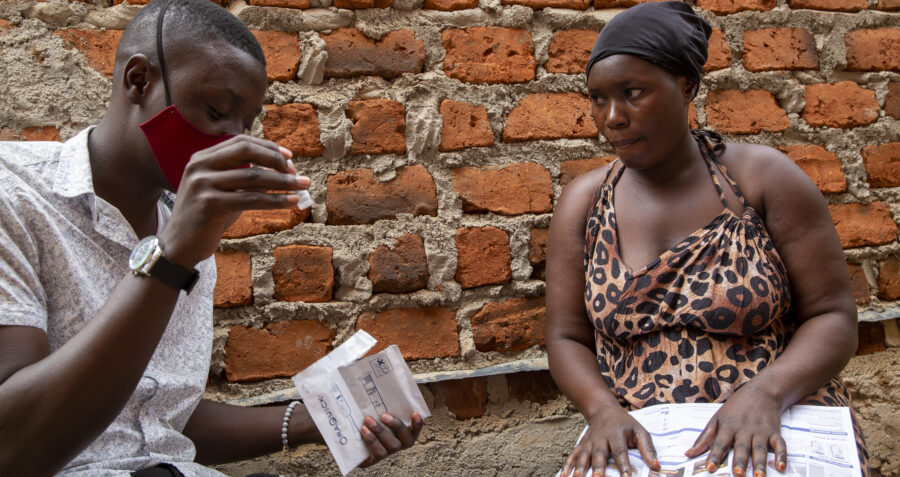HIV testing for marginalised communities

Key information
- Organisation: Alive Medical Services (AMS)
- Country: Uganda
- Region: Eastern and Southern Africa
- Stage of innovation: Stage 6: In the market and ready to scale
- Start date: March 2021
- End date: July 2022
- Type of innovation:
- Budget: 63,000 USD
- Funder: Elton John AIDS Foundation (EJAF)
Summary of intervention
Before COVID-19, the Ugandan Government only allowed a few limited categories of people to use HIV self-tests kits. This changed during the pandemic, as the number of people attending walk-in centres and outpatient facilities dropped. To maintain access to HIV testing, the government relaxed the rules and AMS seized the opportunity to offer HIV self-tests to marginlised communities who often don’t go health facilites or access testing.
Peer educators worked alongside local community leaders to identify people who were eligible for a test. Many of them were from marginalised and stigmatised communities and would normally avoid visiting health facilities for fear of discrimination. The peer educators took tests to people’s homes or to private locations in the communities. Initially, the intervention was designed purely to offer tests, but once the service was established, peer educators also offered follow-up support. Those who tested positive were accompanied to a health centre for a confirmatory test, helped to initiate antiretroviral treatment and supported with adherence. Those who tested negative were given information about prevention methods and access to the commodities they needed, from condoms to pre-exposure prophylaxis – PrEP.
- 2,586 HIV self-testing kits were issued — 140 people received a positive test result and every one of them began HIV treatment.
- 134 of the people who had a negative test result chose to begin taking PrEP.
learnings
One of the benefits of this approach was that it allowed people to test in complete privacy without the fear sometimes associated with attending public health facilities. As many of the communities, including the LGBT+ community, are small, and everyone knows each other, confidentiality is crucial. It was important that the peer educators underwent specific training to ensure they kept all information confidential. This service was particularly useful for people who experience stigma and discrimination. from health care workers and the wider community. This intervention shows the importance of not offering testing in isolation, but in following up with ongoing support, prevention and treatment services.
next steps
Currently, when someone receives a positive result, they must visit a health facility for a confirmatory test. Some people are reluctant to do this and would benefit from being able to take a confirmatory test in or near their home with support from a peer educator.
sustainability
The project has so far been limited to urban areas, but extending it to rural areas would also benefit those communities.
The intervention is wholly dependent on peer educators who are only able to offer this service if their costs are covered. For sustainability, the cost of their travel and other expenses must be included in the budget for this type of intervention.
Find out more information about the Accelerating Innovation project.

